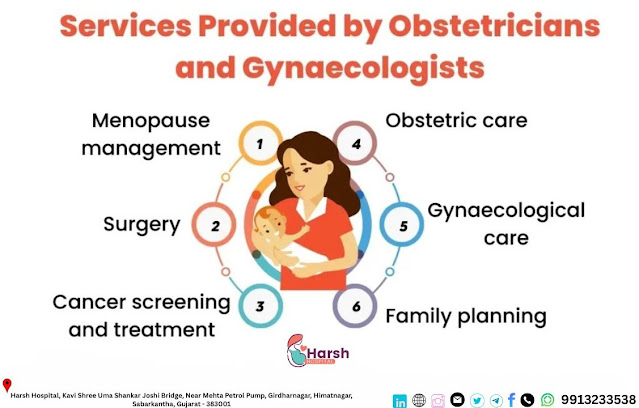 |
| 6 Amazing Yoga Poses for Pregnancy |
Gentle Movement. Deep Connection. Healthy Motherhood.
Pregnancy is a beautiful journey of transformation — physically, emotionally, and mentally. As your body changes, it’s essential to support it with gentle, mindful movement that promotes strength, flexibility, and calmness.
At Harsh Hospital, Himatnagar, we encourage expecting mothers to explore the safe and soothing world of prenatal yoga — especially these 6 simple yet powerful poses.
⚠️ Always consult your doctor before beginning any new exercise routine during pregnancy. These poses are generally safe during the second trimester, unless contraindicated.
🤰 Benefits of Prenatal Yoga:
-
Reduces back pain, swelling, and fatigue
-
Improves posture, circulation, and digestion
-
Helps manage stress, anxiety, and insomnia
-
Prepares the body for labor and delivery
-
Deepens the bond with your baby
🌿 6 Safe & Effective Yoga Poses for Pregnancy
1️⃣ Cat-Cow Pose (Marjaryasana-Bitilasana)
Why it's amazing:
-
Strengthens spine and core
-
Eases lower back tension
-
Improves pelvic flexibility
How to do it:
Come on hands and knees, inhale to arch the back (cow), exhale to round it (cat). Repeat gently.
2️⃣ Bound Angle Pose (Baddha Konasana)
Why it's amazing:
-
Opens the hips and pelvis
-
Promotes good circulation in the lower body
-
Helps prepare for delivery
How to do it:
Sit tall with soles of your feet together, knees dropped to the sides. Hold your ankles and breathe deeply.
3️⃣ Wide-Legged Child’s Pose (Balasana)
Why it's amazing:
-
Relieves tension in back and shoulders
-
Calms the mind
-
Opens hips gently
How to do it:
Kneel and bring your knees wide apart. Fold forward with arms extended or under your head for support.
4️⃣ Warrior II (Virabhadrasana II)
Why it's amazing:
-
Builds stamina and strength
-
Improves balance
-
Encourages confidence and grounding
How to do it:
Stand with feet wide, bend one knee, arms outstretched. Keep your gaze forward and steady your breath.
5️⃣ Legs Up the Wall (Viparita Karani)
Why it's amazing:
-
Eases swollen feet and tired legs
-
Supports venous return
-
Calms the nervous system
How to do it:
Lie on your back with your legs up against a wall. Use a bolster under hips for comfort. Avoid in late pregnancy if uncomfortable.
6️⃣ Seated Side Stretch (Parsva Sukhasana)
Why it's amazing:
-
Stretches the waist and spine
-
Relieves tightness from the growing belly
-
Enhances breath awareness
How to do it:
Sit cross-legged, inhale and lift one arm overhead, exhale as you gently bend to the opposite side. Repeat both sides.
💡 Pro Tips for Prenatal Yoga:
-
Practice on a non-slip yoga mat
-
Avoid lying flat on your back after the first trimester
-
Stay hydrated and take breaks
-
Use props like bolsters, pillows, or blocks for support
-
Always listen to your body and skip poses that cause discomfort
👩⚕️ Yoga and Prenatal Care at Harsh Hospital
At Harsh Hospital, Himatnagar, we offer:
-
Expert gynecological guidance on safe yoga
-
Antenatal counseling
-
Group or individual pregnancy fitness support
-
Laparoscopic and normal delivery facilities
-
Full maternity monitoring
We believe that a calm mind and strong body lead to a smoother pregnancy and safer delivery.
📍 Visit Us: Harsh Hospital, Himatnagar
📞 Book Consultation: +91-9913233538
🌐 Website: www.harshhospitals.com
👩⚕️ Trusted by mothers across North Gujarat
📢 Hashtags:
#PregnancyYoga #PrenatalYoga #HarshHospitalHimatnagar #YogaForMoms #PregnancyWellness #MaternalHealth #AntenatalCare #YogaForPregnancy #HealthyPregnancy #PrenatalFitness #HimatnagarDoctors #MotherhoodJourney #CalmPregnancy #LaborPreparation #PregnancyCareIndia #WomensHealth #HarshHospital #BreathAndBalance








